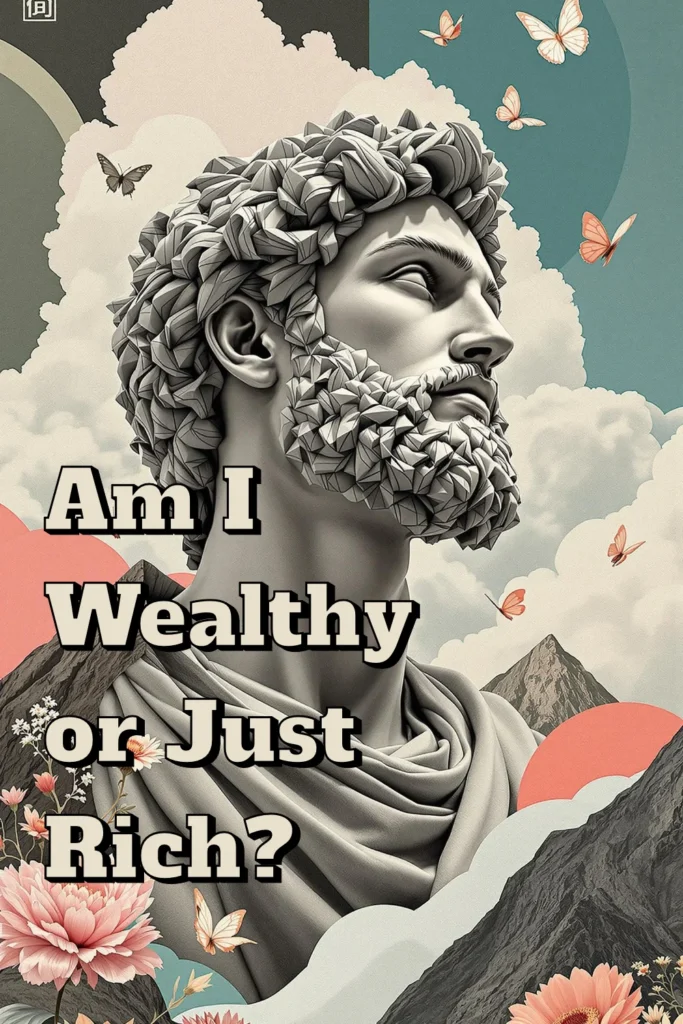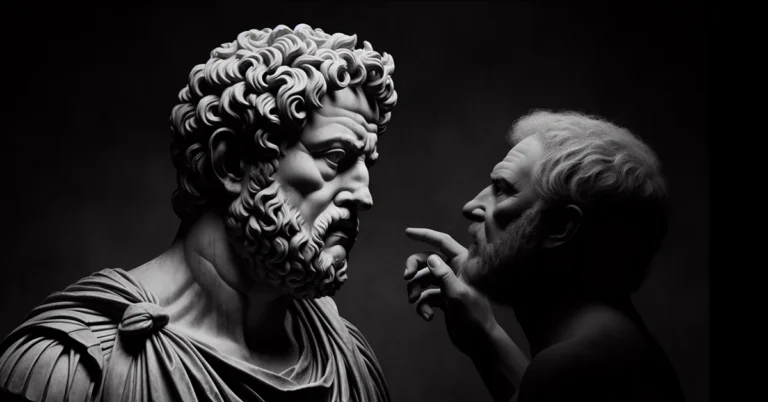Rich vs wealthy — like Moriarty and Sherlock, they look similar from a distance, but one serves chaos while the other masters it. Can you be both?
Most chase money. Few seek meaning. The Stoics warned us: “Wealth consists not in having great possessions, but in having few wants.” — Epictetus. In a world obsessed with more, Stoic philosophy pulls us back to what matters — inner peace, self-control, and authentic happiness. This isn’t just about being rich. It’s about being free. So what does it truly mean to be wealthy? Let’s find out.
Rich vs Wealthy
The Stoic Philosophy Behind Extreme Wealth and Inner Peace
In today’s world, “rich” and “wealthy” are thrown around like they mean the same thing. But in the eyes of the Stoics — and anyone chasing authentic happiness — they couldn’t be more different. While one is based on external numbers, the other is rooted in inner peace. One can be taken. The other? Earned through discipline, self-control, and philosophy.
What’s the Difference Between Being Rich and Being Wealthy?
You can be affluent without being free. That’s the Stoic warning.
Being rich is often measured by material things: a high salary, a luxury car, a bigger house, and flashy vacations. It’s about how much money you’ve stacked — how much you can show off. But this kind of wealth is fragile. It depends on markets, jobs, and constant earning.
Being wealthy, according to Stoic philosophy, is something deeper. It’s about emotional independence. It’s a man who doesn’t flinch when his fortune disappears, because he never based his identity on it. As Seneca wrote,
It is not the man who has too little, but the man who craves more, that is poor.
The Stoics didn’t care how much you had. They cared about how little you needed. That’s wealth.
Are Rich and Wealthy the Same Thing?
Not even close.
Rich is about money spread — your assets, your income, your possessions. But rich vs wealthy becomes clear when you apply Stoic principles: Are you in control, or are you owned by your desires?
The rich man buys comfort. The wealthy man is comfortable, even in discomfort. The rich man needs more. The wealthy man can walk away from more and still feel whole.
Seneca the Younger said it best:
Wealth is the slave of a wise man. The master of a fool.
This is the psychological divide: Rich owns things. Wealthy owns himself.
Is Wealthy Richer Than Rich?
In the Stoic world? Absolutely.
You could be extremely wealthy and never make headlines. No jets. No jewelry. Just freedom from fear and mastery over desire. Epictetus — born a slave — became one of the richest minds in Roman history without owning a single coin. Why?
Because he understood this truth:
He is a wise man who does not grieve for the things he has not, but rejoices for those which he has.
Stoic wealth isn’t measured in money shots — it’s measured in how little you depend on them. That’s true richness. That’s freedom.
The Money Trap
Why Being Rich Isn’t the Same as Being Happy
Money is a tool. But for most people, it becomes a trap.
In a society obsessed with the pursuit of happyness, being rich is often mistaken for being happy. Flashy cars, designer clothes, first-class flights — the so-called “money shot” lifestyle. But Stoic philosophy asks a brutal question: If your happiness is for sale… is it even real?
The Stoics knew the truth. Authentic happiness has nothing to do with how much you earn — and everything to do with how much you can endure without breaking.
What Does It Mean for You to Be Rich?
Most people define “rich” by their money spread — the size of their paycheck, the square footage of their house, or the brand stitched onto their coat. It’s a money shot fantasy fed by marketing and ego. But being rich without character is like drinking saltwater when you’re thirsty — the more you consume, the worse you feel.
To the Stoics, riches without virtue equal a poor soul. Seneca warned:
It is not the man who has little, but he who desires more, that is poor.

A rich man who lacks discipline is not free — he’s enslaved by his cravings. The Stoic doesn’t envy him; he pities him.
If your sense of worth rises and falls with your bank account, you’re not rich — you’re at risk.
Can You Be Rich but Not Wealthy?
Absolutely. In fact, most people are.
You can have a lot of money and still feel empty. You can sit in a luxury penthouse and feel lonelier than a monk in the mountains. The reason? You’ve built your life for money, not for meaning.
This is what the Stoics would call the pre-rich mindset — a mind ruled by fear, status, and scarcity. The man who has millions but still panics at the thought of losing it… is not wealthy. He’s in chains.
Compare that to the Stoic who practices self-control and lives by values, not vanity. He may have less, but he sleeps better, stresses less, and needs no applause to feel whole.
One of the most Stoic observations of all Epictetus sayings is this one:
Freedom is the only worthy goal in life. It is won by disregarding things that lie beyond our control.
The true test of wealth isn’t what you can buy — it’s what you can walk away from and still feel at peace.
Stoic Wisdom on True Wealth and Happiness
When the Stoics spoke about wealth, they weren’t counting coins. They were measuring character.
In Stoic philosophy, a wealthy man isn’t defined by his fortune, but by his freedom. Freedom from fear, from envy, from the endless itch for more. And that freedom? That’s the foundation of authentic happiness.
The modern world confuses pleasure with peace, luxury with contentment. But the Stoics — from Zeno of Citium to Seneca and Epictetus — taught us a different kind of abundance: inner stillness. Wealth, to them, was a life built around virtue, not vanity.
Let’s look at what makes someone truly wealthy.
What Is Considered a Wealthy Person?
You can’t spot a wealthy man by the size of his house or the brand of his watch — but you can hear it in the way he speaks and feel it in the way he walks. He doesn’t need to prove anything.
The Stoics defined wealth as self-possession. To own yourself fully — your desires, emotions, and time — is to live richly. It’s the man who doesn’t chase approval, doesn’t fear loss, and doesn’t flinch at hardship.
Seneca said:
Freedom is the only worthy goal in life. It is won by disregarding things that lie beyond our control.
In other words, the truly wealthy don’t just survive storms — they expect them. And they prepare, not by hoarding riches, but by training their minds.
How Do You Describe a Wealthy Person?
A wealthy person in Stoic terms lives a happy life — not in the loud, performative way the world celebrates, but in quiet carpe diem moments. They’re fully present. They’re hard to shake. And they know the difference between a luxury and a liability.
They’re being happy, not because everything is perfect, but because they’ve stopped demanding that it be.
Epictetus reminds us:
Wealth consists not in having great possessions, but in having few wants.
The wealthy person is grounded, content, and free — not because they have everything, but because they need so little.
What Determines If You Are Wealthy?
Forget numbers. Ask yourself this instead:
Can I enjoy what I have without needing more?
Can I stay calm when things go wrong?
Do I live on my terms, not someone else’s timeline?
These are the questions the Stoics asked. And these are the questions echoed in modern philosophies like Ikigai: The Japanese Secret to a Long and Happy Life — a life with purpose, simplicity, and balance.
Seneca wrote:
It is not the man who has too little, but the man who craves more, that is poor.
So, what determines if you are wealthy? It’s not your bank account. It’s your mindset. Your ability to stand still while the world spins in chaos. Your refusal to sell your soul for comfort.
In Stoicism, wealth isn’t flashy. It’s quiet. Grounded. Unshakable.
Am I Wealthy or Just Rich?
Stoic Self-Reflection
Rich vs wealthy isn’t just a financial distinction — it’s a personal one. And it gets uncomfortable fast.
A man can look rich. Big house. Expensive suit. Status car. But wealth? That’s harder to spot — because it’s not worn on the outside. It’s a mindset, a lifestyle, a quiet power. According to Stoic principles, if your peace depends on your possessions, you’re not truly wealthy — you’re just well-decorated.
Real wealth isn’t visible. It’s felt. In how you react to loss. In what you value when no one’s watching. In your ability to experience happy thoughts, even when everything’s going wrong.
Here’s how to know the difference.

Can You Tell If Someone Is Truly Wealthy?
The truth? Most of the time — no.
You can’t always tell who’s rich. But you especially can’t tell who’s truly wealthy. Because poor vs wealthy isn’t about appearances. It’s about how they live when things fall apart.
The Stoics taught that real wealth is invisible. You won’t find it in flashy jewelry or high-end tech. You’ll find it in someone who can walk through chaos without losing their composure. In someone who doesn’t feel the need to impress. In someone who can say “no” to more — and mean it. Seneca quote:
You act like mortals in all that you fear, and like immortals in all that you desire.
So no, you can’t always tell who’s wealthy. But you can feel it when someone is grounded. Stoic wealth is a presence — not a performance.
Am I Wealthy or Just Rich?
Here’s the hard part: you need to ask yourself.
Not based on your income. Not based on what people think of you. But based on how you feel when you’re alone, when the noise fades, when there’s nothing left to buy.
Try this Stoic-style reflection:
If I lost everything tomorrow, would I still know who I am?
Am I more focused on appearing successful, or being at peace?
Can I handle boredom without reaching for distractions?
Do I need more, or do I just need clarity?
Am I chasing someone else’s definition of happiness?
These questions are brutal — but they’re clean. They cut through the noise.
As the old saying goes, “Early to bed and early to rise makes a man healthy, wealthy, and wise.” But the Stoics would add: only if you rise with intention, and sleep with integrity. Seneca quote:
He is most powerful who has power over himself.
So… are you rich? Or are you wealthy?
Only one of those leads to authentic happiness. The other just keeps you busy until you burn out.
And if you are interested in writing your Stoic journal, you can find it here.
Is It Better to Be Rich or Wealthy? The Stoic Answer
The question sounds simple. Rich vs wealthy — who wins?
Modern culture will shout: “Rich!” More cash. More stuff. More status. More money spread. That’s what we’re sold. That’s what’s on magazine covers, in every YouTube ad, in every conversation that starts with, “What do you do?”
But the Stoics? They would’ve laughed.
Because to them, this wasn’t just a question of economics. It was a question of character.
If you’ve read Stumbling on Happiness (Daniel Gilbert) or The Art of Happiness (Dalai Lama and Howard Cutler), you’ve probably noticed the overlap: both ancient and modern thinkers agree — money is a tool, not a guarantee. Riches might buy comfort, but they can’t buy clarity, peace, or resilience.
Is Being Rich Better Than Being Wealthy?
Being rich might make life easier. But being wealthy — in the Stoic sense — makes life better.
Being rich means you’ve got a lot of money. But being wealthy means you’re not owned by it.
Seneca the Younger put it plainly:
A great fortune is a great slavery.
He saw it happen often — men with palaces and power, panicked at the idea of losing any of it. Their wealth didn’t free them — it trapped them.
Compare that with a Stoic, someone who has enough, and knows it. Marcus Aurelius — emperor, warrior, philosopher — had access to everything. And still, he wrote:
Very little is needed to make a happy life; it is all within yourself, in your way of thinking.
So no, being rich is not better than being wealthy, not if your riches come with restlessness.
The man who has millions but no control over his mind is poor. The man who has little but lives on his own terms? That’s real wealth.
Here’s how to tell which one you’re chasing:
Rich wants more. The wealthy want enough.
Rich needs applause. The wealthy need inner peace.
Rich counts dollars. Wealthy counts moments of stillness.
In the end, the Stoics weren’t against money. They were against being dependent on it.
So next time you’re asked what you want out of life, don’t just say “money.”
Say this instead: “I want the kind of wealth that no one can take from me.”
And live like you mean it.
Practicing the Art of Happiness — How to Live Like a Wealthy Stoic
Most people chase happiness the same way they chase money — fast, frantic, and outside of themselves. But the art of happiness, according to the Stoics, isn’t something you find out there. It’s something you practice. Daily. Deliberately. Quietly.
Unlike modern self-help trends that promise a dopamine high in five steps or less, Stoic philosophy is brutally honest: life will be hard. You will lose things. People will disappoint you. Fortune will flip. The question is — will you crumble with it?
Here are three ancient Stoic disciplines that lead to happy days — not the loud, fake kind, but the quiet, grounded kind that lasts.
Voluntary Discomfort — Training for Real Life
Most people avoid discomfort like it’s a disease. But the Stoics? They invited it in — on purpose.
Seneca, one of the richest men of his time, would regularly sleep on the floor, eat bland food, and wear rough clothes. Not because he had to — but because he wanted to remind himself:
We suffer more often in imagination than in reality.
This is voluntary discomfort — a practice where you strip things down to their bare minimum to prove to yourself that you can survive without them. It breaks your addiction to luxury and strengthens your tolerance for hardship.
Try this:
Take cold showers for a week.
Eat the same simple meal for three days.
Leave your phone at home for 24 hours.
Each of these is a quiet rebellion against entitlement. And it teaches you the truth: If you can thrive in discomfort, you’re truly free.
Negative Visualization — Imagine the Loss Before It Happens
Sound depressing? That’s because modern minds are soft.
Negative visualization is one of the most powerful tools in Stoicism — and it’s been echoed in everything from Buddhist teachings to modern psychology. The idea is simple: Spend a few moments imagining the loss of something you love… so you can value it properly.
Marcus Aurelius practiced this every day. He reminded himself that the people he loved, the body he lived in, and the empire he ruled could all vanish. And instead of making him sad, it made him grateful. One of the most sobering quotes from Marcus Aurelius:
You could leave life right now. Let that determine what you do and say and think
You don’t need to become paranoid. You need to become present. This practice cuts through anxiety, overthinking, and self-pity — and brings you straight into the now.
That’s real happiness. That’s awareness.
Minimalism — The Shortcut to Happy Days
You don’t need a bigger house. You need fewer distractions.
The Stoics weren’t monks, but they lived like minimalists long before it became a trend. They knew that chasing “more” was a game that never ends. And worse — it’s a game that owns you.
Seneca warned:
It is not the man who has too little, but the man who craves more, that is poor.
The Letters from a Stoic are filled with reminders that the simpler the life, the easier it is to enjoy. A walk becomes a gift. A quiet room becomes a palace. Minimalism isn’t about owning nothing — it’s about needing less.
Here’s how to start:
Remove one commitment you hate.
Donate five things you don’t use.
Say “no” twice as often this week.
Less isn’t empty. Less is clarity.





